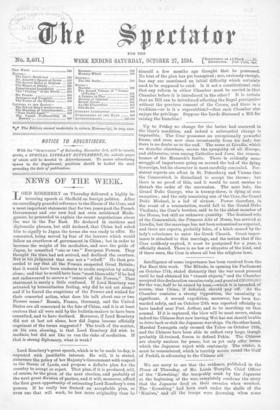Up to Friday no change for the better had occurred
in the Czar's condition, and indeed a substantial change is impossible. The Czar possesses an exceptionally powerful. frame, and even now rises occasionally from his bed ; but there is no doubt as to the end. The scene at Liva-dia, which we describe elsewhere, moves the sympathy of all Europe, and obliterates, even among Catholics and Jews, the remem- brance of the Monarch's faults. There is evidently some struggle of importance going on around the bed of the dying Sovereign, but its character is most carefully concealed. Per- sistent reports arc afloat in St. Petersburg and Vienna that the Cesarewitch is disinclined to accept the throne; but there is no proof of this, and it would be most unwise to disturb the order of the succession. The next heir, the Grand Duke George, who is twenty-three, is dying of con- sumption; and the only remaining son of the Czar, the Grand Duke Michael, is a lad of sixteen. Power therefore, in the event of a renunciation, would fall to the Grand Deice Vladimir, the Czar's brother, said to be the ablest member of the House, but still an unknown quantity. The destined wife of the Cesarewitch, the Princess Alix of Hesse, has arrived at Livadia, but the marriage has not been solemnised as expected, and there are reports, probably false, of a hitch caused by the lady's reluctance to enter the Greek Church. Great impor- tance is attached to this marriage, and the notion that if the Czar suddenly expired, it must be postponed for a year, is officially denied. There is no law or etiquette of the kind, and if there were, the Czar is above all but the religious laws.






































